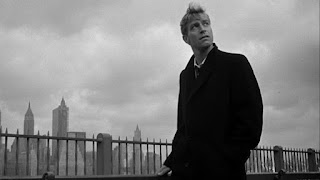The history of the casting of "Youngblood Hawke" is a classic of Hollywood irony. Warren Beatty was originally given the title role in the potboiler based on Herman Wouk’s bestselling novel about a young truck-driving writer from Southern coal country who becomes the toast of the New York publishing world and social scene (allegedly the tale was based loosely on the life of Thomas Wolfe). But Beatty got into a contract dispute with Warner Brothers that supposedly so enraged Jack Warner that he fired Beatty and hired rising star James Franciscus instead. People wondered if Beatty had ruined his career, while Franciscus was suddenly seen as a superstar-in-the-making. “Just as James Franciscus had grown accustomed to being an also-ran, he turned up a winner” wrote an Associated Press columnist, “The lean blond actor captured one of the prize roles of the season as Herman Wouk’s hero in 'Youngblood Hawke'.” But then, as if in a plot reversal worthy of the melodramatic "Hawke", the movie was almost universally panned, despite a stellar cast, and Franciscus was never again cast in a dramatic lead of such importance (although in hindsight, "Beneath the Planet of the Apes” has endured much better than many of the “important” dramatic films of the time). “Poor James Franciscus,” mourned Time magazine almost a decade later. “Once upon a time he was known as the Richard Chamberlain who could act, and act he did in Mr. Novak... Franciscus then starred in one of the worst Hollywood movies ever made, 'Youngblood Hawke', and hasn’t been the same since.” Beatty, of course, went on to megastardom in the 1970s before disappearing into obscurity himself a few years later.


















In retrospect, "Youngblood Hawke" is not at all a bad film compared to others in its genre or even compared to other supposed highbrow dramatic fare from the time. The acting is uniformly excellent, with the only false note being Franciscus’ own on-again-off-again Southern accent, which led critics to wonder how the prep-schooled Yalie could have ever been chosen for such a role. Which is again ironic, because Franciscus himself actually lived a life somewhat similar to Hawke’s. Franciscus had a Huck Finn boyhood in small-town Missouri before being transported to New York City upon the death of his father and remarriage of his mother, and, like Hawke, he aspired to be a writer. He plays the part of a young writer much more believably than most of his contemporaries could have, except maybe Paul Newman, who would have been problematic for other reasons.
More >



































































